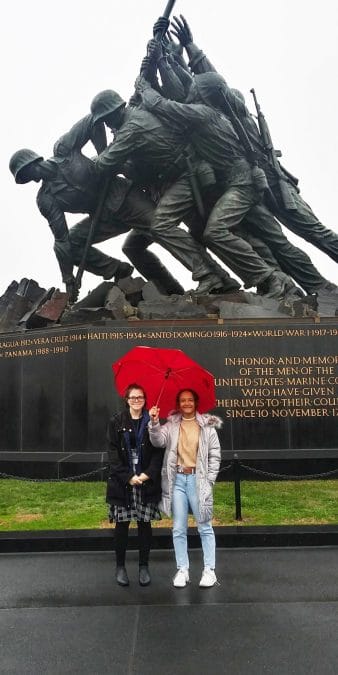The Citizen Potawatomi Nation Department of Education sent two Tribal members for the Close Up Foundation’s American Indian and Alaska Native Youth Summit in Washington D.C. Taylor Tade and Kylie Carter spent six days this February in the country’s capital, meeting with Native American leaders in politics, visiting historic landmarks and utilizing their knowledge to present ideas for growth in Indigenous communities.
Tade is a junior at Bridgeland High School in Cyprus, Texas. Living a considerable distance from CPN headquarters near Shawnee, Oklahoma, she felt Close Up provided an opportunity to connect.

“I’m really interested in getting to know more about my culture and my heritage, but because I live so far away from the actual Tribal grounds, I don’t often get to meet with people or discuss it. So, I just wanted to be able to expand my knowledge on that a little more,” Tade said.
Carter, whose Potawatomi name is Wabse or Swan, is a freshman at Mountain Pointe High School in Phoenix, Arizona. She moved to Phoenix from Norman, Oklahoma, where she frequently took part in Tribal gatherings. Her dad is a lawyer for the Gila River Indian Community, and she often discusses Indigenous political issues over dinner at home. She was interested in spending time where national laws come to life after her parents told her about the program.
“I went into it for more of the political experience, knowing how I can affect my local government and even national government,” Carter said. “But I didn’t expect to get out more things about my Native American heritage, but I found that we focused a lot on it throughout the trip. And it made me feel very proud of my heritage.”
Women in leadership
Tade and Carter spent time with two Native American congresswomen — Deb Haaland, who represents New Mexico’s 1st District, and Sharice Davids, House Representatives member for Kansas’s 3rd Congressional District.
“She mainly talked about her journey in becoming a congresswoman and her beginnings and being Native American and how she came to terms with being different. But also knowing that she could still be a congresswoman, and having her differences helped her through that,” Carter said about meeting Davids.
Listening to each speak about their struggles and achieving their dreams made the outcome seem more attainable for Carter. Tade enjoyed her time with the representatives as well, particularly the chance to view how Native history affects Indigenous people politically on a national level today.
“I think people like Deb Haaland and Sharice Davids and all the people that are representing Natives now are really fighting and trying to overcome those kinds of things that have happened in the past,” Tade said.
While the program did not specifically focus on women and female empowerment, it helped both attendees’ confidence. They also saw Silent Sky at Ford’s Theatre, a play about the life of Henrietta Swan Leavitt, an astronomer at Harvard College Observatory in the late 1800s. She and a group of women known as “computers” set standards in their field and helped astronomer and physicist Edward Pickering map the universe.
“It’s really cool because she was a woman, and women weren’t even allowed to use the telescope back then,” Carter said.
Group work
Both CPN members at Close Up worked with attendees representing the Wichita and Affiliated Tribes on a project to outline a potential solution for an issue facing Indian Country. They chose to focus on health, specifically diabetes and heart conditions like high blood pressure that affect Native populations at a higher rate than the general population.
“We wanted to create an environment where people could learn about health issues and how to avoid these things,” Carter said. “So, we wanted to create a health center or a community center that people could join, take classes on how to make healthy choices, things like that.”
They wanted to include a place to grow fresh produce, teach cooking classes and even shop for healthier options. For Tade, working on the project taught her the value of brainstorming across communities.
“We didn’t always just disagree. On certain things, we all kind of had similar views. And we all kind of were coming from a point of, ‘I want to learn something from you because you have a different experience than me,’ and I thought that was really, really interesting,” Tade said.
The program also split the participants into smaller groups for a mock congressional trial. In teams, they each took on different roles after being assigned an issue and their position. Carter was a lobbyist in favor of raising the federal minimum wage, which she enjoyed more than she anticipated. Thanks to Carter’s work, the raise passed.
“It was fun, actually,” she said. “I thought I was going to be nervous talking to a group of 20 people, trying to persuade them into this thing and then taking questions. But I wasn’t as nervous as I thought I was going to be once I just started talking.”
They spent much of their trip exploring the Nation’s capital and learning from museums and historic sites. Their visits included the Vietnam Veterans Memorial, White House, Thomas Jefferson Memorial, United States Air Force Memorial and more. They both appreciated the architectural beauty of the Lincoln Memorial and the Smithsonian Institution’s National Museum of the American Indian.
Close Up inspired Tade to continue her love of political science and newfound interest in Native American issues. She looks forward to becoming more involved in her community and participate on a larger scale as she gets older.
Carter enjoys social studies, and her family’s path in law sparks a flare for becoming a congressperson. The trip to Washington laid it out in front of her, allowing her to see the day-to-day operations of the capital, if she chooses that path.
Keep an eye on opportunities with the Citizen Potawatomi Nation Department of Education at cpn.news/education as well as on the Tribe’s Facebook page, @citizenpotawatomination.
